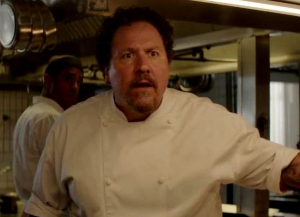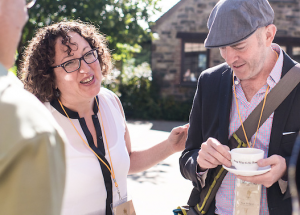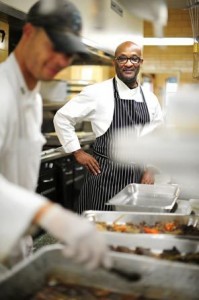
In the movie Chef, Jon Favreau plays a chef on the edge who leaves his crazy white-linen job to run a food truck.
By Laurie Wiegler
In the movie “Chef”, Jon Favreau’s character abruptly quits working for a posh L.A. restaurant that’s been squelching his creativity – as well as forcing him to work under a psycho boss, deliciously played by Dustin Hoffman. The disgruntled chef decides to follow his dream of opening a specialty food truck and the results are, of course, movie magic.
So is art imitating life? Are real-life chefs and would-be chefs quite as bold after they’ve been stifled creatively? Turns out yes, even if most interviewed won’t cop to being quite as miserable as Favreau’s Chef Carl was onscreen.
Pride of ownership
Oklahoma City-based chef Jonathon Stranger, co-owner of popular restaurant Ludivine, attended the world-class Institute of Culinary Education, yet in his early 20s his life was a mess. Working in restaurants seemed to fuel an alcohol-and-pills habit, in part because of the plentiful supply he found through working in kitchens, but mainly because of where his head was at.

Chef Jonathon Stranger went from recovery to creative riches with his world-class restaurant Ludivine, which has brought the farm-to-table concept to Oklahoma City, his hometown. Photo © Quit Nguyen
While they say one needs to hit “rock bottom”, Stranger also needed a bit of maternal intervention–after returning to work in New York, where he’d gone to school, his dangerous habits resurfaced.
“I thought I’d be happy back in New York. But I came home and my mother, who’s been in recovery, saw me and said, ‘before you go to New York, maybe you should consider drug treatment.’ I was broke, and back living at my parents’.” After checking into Betty Ford at 26, he stopped taking drugs and drinking. He’s been clean and sober for six years.
The idea to open Ludivine hit him when he was working on an organic farm in Oregon.
“I was cooking food from a farm. I knew the products here [in Oklahoma City] existed to do the level of food I wanted to do, and when I was in Oregon I knew I wanted to be back in Oklahoma and doing my own thing, and I was confident that I could,” Stranger says.
At Ludivine, they use the “whole animal” he said and work as closely as they can with farmers to further the farm-to-table experience.
“Everything we serve is from Oklahoma besides the seafood,” he says. “The food is modern American Euro-ish, and the menu changes every day.”
He laughs at the question of whether there are vegans and vegetarians in hamburger-happy Oklahoma.
“Oh yeah!” he enthuses. “And we usually have two to three vegetarian dishes [on the menu]. It’s not even consciously, necessarily. For example, I am picking up a bushel of corn today and so I won’t do much to it. We will just have a corn based dish [tonight], so by default it will be vegetarian.”
The Missing Ingredient

Irene Hamburger was a frustrated banking professional who realized her dream by going back to school at the International Culinary Center. Photo © Kirra Cheers
With a notable career in the political sector and in banking, Irene Hamburger tried to ignore the voice insisting that she belonged in food. Now as vice president of Blue Hill Farm, a group of restaurants in Manhattan and the Hudson Valley, Hamburger is home at last.
Hamburger graduated from the International Culinary Center in New York in 1998, but prior to that, she worked for U.S Senator Dennis DeConcini, and later entered the private sector working at an international bank in New York.
Yet, she wasn’t happy.
To hear her explain it, her banking boss was terrific and fully supportive when she went to him and said she wanted to take a nine month-long night course at the Culinary Center.
“I had a boss who was very, very supportive,” she says, explaining that she didn’t assume she’d immediately “make the leap” to cooking.
After all, she says, “If you are a New Yorker you can continue [working at the bank job]. It seemed at the time the only natural thing to do.”
Yet after she obtained her certificate, she was unimpressed by working for caterers part-time.
“And then one day, a friend said, ‘I have an opening in my new restaurant, and would you have an interest speaking to this chef?’ Again, I had a really supportive boss [at the bank].”
This meant not only that he supported her dreams but helped guide her course. For, after a short leave of absence, he required her to come back into the office and work before giving official notice. Right away, he came to her and said, “If you’d like to give your two weeks’ notice now, you can.”
She worked first at Monkey Bar and then for Dan Barber Catering, before helping Barber open Blue Hill at Stone Barns and Stone Barns Center for Food and Agriculture.
And even though she’s not in a cooking role at Blue Hill, she continues promoting farm-to-table issues that affect agriculture and consumers throughout the Hudson Valley.
Oh yes, and on the weekends friends can find her in the kitchen.
“If it’s cold, any time from fall on I love roasting–really, really, slow roasting–crazy tender cuts of meat where people can just pull it off themselves,” she says.
“And I have a dish inspired by a couple other dishes, where I serve celery with anchovy and Marcona almonds.”
From Kitchen to Creamery
For some chefs, a career switch can be inspired by an interest in getting more involved in the food supply.
For Chef Alex Seidel with Denver’s Fruition restaurant, such was the impetus. He had been running his farm on the side for a few years when the lightbulb blazed. The reasons for changing course just seemed to add up right.
“I wanted to learn more about the ingredients that make up my menus,” he says. “I’m from Wisconsin and always wanted to make cheese. Finally, the change offered varied experiences for my chefs.”
Fruition Farms, Colorado’s only registered sheep dairy, houses a cheesemaking facility run by Jimmy Warren; Seidel raises pigs and sheep, and with partner Josh Halder at Verde Farms creates an open window that showcases sustainable farming for visitors.
“This summer in Denver’s Union Station, I will be opening my first “old world” market and restaurant concept,” he says. “So I guess I wear many hats but all of them revolve around food.”
And for other chefs, like Jim Watkins of Bastyr University in Washington State, a university heralded for its work on homeopathic and natural medicine, the idea can strike seemingly out of nowhere.
“I have always had a great appreciation for the art of cooking, but never even considered the idea of making a living as a culinarian,” he says. “After 20-plus years as a social worker I was incredibly burned out so I decided to go to nursing school; I soon discovered that was not what I was looking for, though.”

Jim Watkins of Bastyr University has brought organic, fresh foods locally sourced to the university kitchen. Photo courtesy Bastyr University
Then one day he was flipping through some old copies of Gourmet and “knew immediately that this was what I had been looking for and enrolled in cooking school two months later,” he says.
He would end up co-founding Cafe Flora, an iconic Seattle vegetarian restaurant featured on the Food Network’s “On the Road” series, before eventually becoming the foodservice director for Bastyr.
With his formal counseling days behind him, Watkins now finds that working out other sorts of problems are more his cuppa tea. “I consider myself a coach and mentor at this point,” he says. “When I started at Bastyr I felt that new systems needed to be put in place to create a more streamlined and creative operation. There needed to be stronger leadership in the kitchen and the menu needed to be more focused on whole body health.”
Now they have a 99 percent organic menu and source many of their food items from local vendors and farmers.
So how is he mentoring exactly? By helping the next generation of culinary talent understand the true nature of deliberately choosing culinary as a profession. “Many people who work in the culinary field are very young and don’t necessarily view it as a long term profession but rather as a pass through on their way to something else. Even if you choose to do it as a serious profession there is such a short window of opportunity to physically meet the demands of the job,” he says. “And in my opinion, the shelf life is just about the same as social work.”

[…] CLICK HERE to read the full article. more newsi-Italy: Dorothy Cann Hamilton on Expo Milan 2015 Video by i-Italy…Women in Food Read more on Andrew F. Smith: My food New YorkInternational Culinary Center is called "the most incredible cooking school" in this Interview with David Kinch of Manresa An interview with The Kitchn: Culinary School DiariesThe Kitchn Assistant Editor Ariel…Scholarship Celebrates 100th Canadian EnrollmentOur ICC Canada Scholarship in the Toronto Sun: SCHOLARSHIP ALERT:…ICC Featured in Marie Claire Korea!Marie Claire Korea says ICC is the best culinary school to achieve your dream in…"Best Cooking School"Read more on San Jose Food Blog: ICC Ferry Building Cook OffPastry Grad Wins IRON CHEF ThailandWe are so proud of 1999 Pastry Arts graduate Jason Licker, who won IRON CHEF Thailand!…Grad Placed “Immediately” at 3 Michelin-Starred Restaurant2013 Professional Culinary Arts graduate Jun Seop Lee's letter to his grandmother was…More Women Filling Sommelier Ranks"Though it's still very much a man's world, more women are moving up the wine ranks,… […]